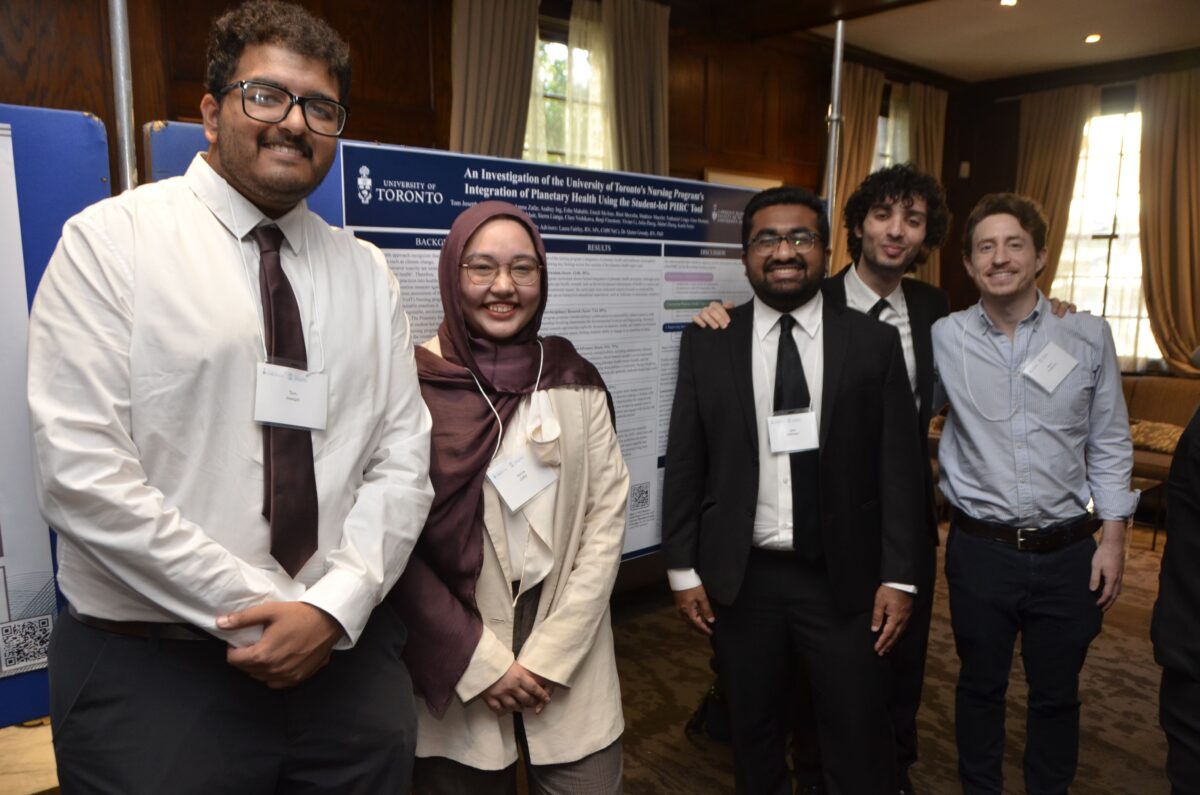Climate anxiety or eco-anxiety – feelings of distress and worry caused by concerns about the impact of climate change – have motivated nursing students like Amna Zafar and Tom Joseph to step into advocacy roles and push for real change.
The two second year BScN students along with their peers Enoch McAtee, Benji Finestone, and Jefin Mathews, were inspired by a 2019 medical student-led initiative called the Planetary Health Report Card (PHRC), a metric-based tool for evaluating and improving planetary health content in medical schools and wanted to use it to track the Faculty of Nursing’s sustainability efforts.
“Use of the tool has been spreading to other universities and colleges, including those focused on other health science fields,” says Zafar who attended a national conference of Canadian Nursing Student Associations (CNSA) where the scorecard was discussed. “It made us realize we could also try this out and track the sustainability of our faculty.”
Joseph, who was involved in the annual student-led Global Health Conference on Climate Change last year, was introduced to the idea of the Planetary Health Report Card by keynote speaker, Fiona Hanley, who also inspired Bloomberg Nursing Assistant Professor Laura Fairley.
“Professor Fairley really helped us gather interested students – we had about 20 – and do a deep dive into what would be needed for this project, and how we could successfully go about it,” says Joseph.
The scorecard focuses on five main areas which included interdisciplinary research, campus sustainability, curriculum, community outreach and advocacy, and support for student-led initiatives, with each section scored accordingly using a points system.
For the purposes of the student-led project, the Faculty scored well on community advocacy and outreach, interdisciplinary research, and campus sustainability, with room for improvement in curriculum and support for student-led initiatives.
Both Zafar and Joseph acknowledged that their findings were limited to interviews with a small group of faculty and staff in the BScN program, and did not include efforts underway in the Faculty’s graduate programs. However, they also came across some surprising findings during their project showing ways the Faculty and the University were already addressing sustainability issues. This included the fact that U of T has ranked number one in the world sustainability, and that the university has four flagship sustainability programs, including a commitment to divest from fossil fuels. The students were also proud to see the many ways the Simulation Lab, a hub of clinical learning at Bloomberg Nursing, embeds sustainability practices in its operations.
“We were excited to see how much effort the Sim Lab makes to reuse items and prevent single use waste. And we were excited to see the research being done between faculty that contained a sustainability perspective like the work being done by Assistant Professors Quinn Grundy and Amy Wright,” say Zafar. “We hope the faculty champions these efforts more, so students are aware of the progress.”
The goal of the scorecard, Zafar adds, is for it to be used as a tracking and measurement metric over time. As each year goes by, determining areas of growth and where change has taken place or needs further improvement is important.

Five BScN students, including Zafar, Joseph, Mathews, McAtee, and Finestone, presented their scorecard findings at the inaugural Climate and Health Symposium facilitated by the Collaborative Centre for Climate, Health and Sustainable Care, of which Bloomberg Nursing is a founding member.
Assistant Professor Grundy, who is also the Associate Director (Nursing) of the Collaborative Centre, says it is inspiring that the students are at the forefront of these changes, and that they see the impact they can have in the nursing profession and the link between health and sustainability.
Following their presentation the students were able to share some of their recommendations for improvement which include the possibility of a sustainability committee, collaborating with faculty and staff on the importance of planetary health, and more climate and health focused topics in curriculum.
Zafar and Joseph are also eager to share other resources with students, faculty and staff about ways they can implement sustainability practices into their everyday lives, from free bike rentals (Bikechain) on campus, to green spaces, battery recycling programs, and more.
“It has been really eye-opening to see the change that has already been enacted following this project,” says Joseph. “To be able to leave this as a foundation for the next cohort of BScN students gives us hope for the continued focus on climate change and its impact on everyone’s health.”
